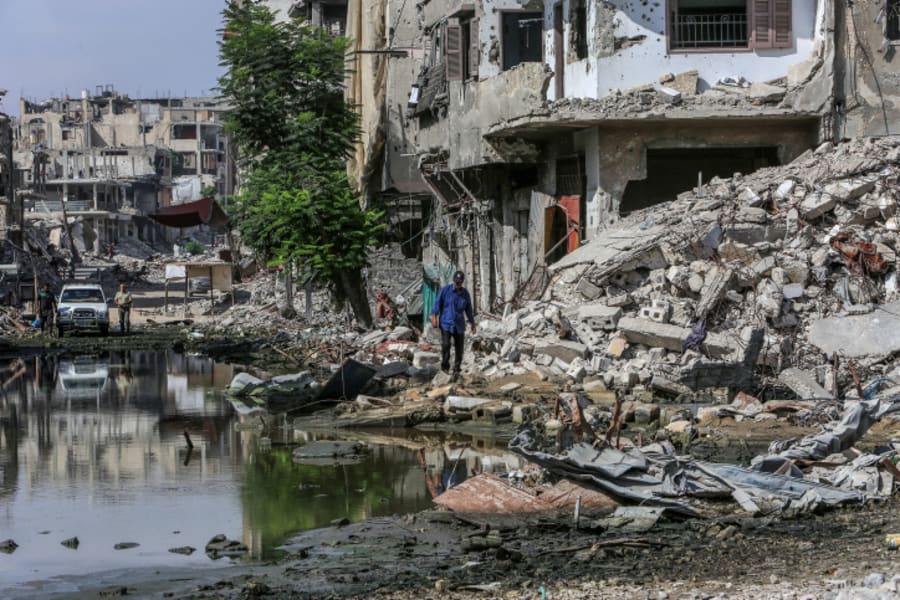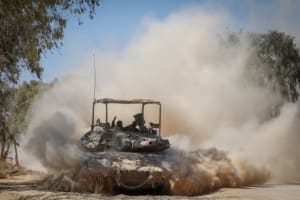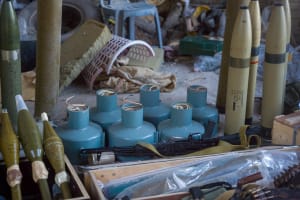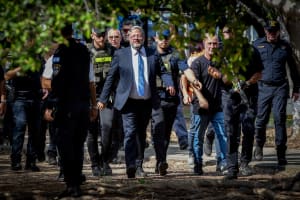Amid the ruins, crime and chaos run rampant in Gaza Strip while public criticism of Hamas increases
Crime hampers humanitarian aid efforts, turns public opinion against Hamas

After fears of a possible famine in the Gaza Strip have been assuaged in recent weeks, increasing lawlessness and rampant crime have become the central humanitarian concern in the enclave.
U.S. State Department Spokesman Matthew Miller said U.S. officials are working with Israel and the United Nations to tackle the issue, adding that a ceasefire and a much-discussed but still-elusive plan for the “day after” would be the best solution.
“Right now, in the places where Israel has conducted military operations but no longer is there on the ground, you do see this anarchy,” Miller stated.
Several news outlets have recently shined a spotlight on this issue, which has worsened to the point that Gazans are no longer afraid to publicly criticize Hamas for their situation.
A Palestinian man with an academic doctorate degree even openly cursed Hamas in a viral video, saying: “I had a good life, but we have a filthy [Hamas] leadership. They got used to our bloodshed, may God curse them! They are scum!”
“Hamas’s military capabilities have been degraded,” a U.S. official involved in aid operations told The Wall Street Journal. “So, too, have its capabilities to enforce law and order, so absolutely nobody should be surprised that this is the situation inside of Gaza right now.”
According to a report by the WSJ, Israeli strikes against the local police forces have been a significant factor contributing to the breakdown of order.
When the war in Gaza against Hamas began last October, Israeli leaders declared the destruction of Hamas’ governmental abilities as one of the primary goals, providing the rationale for strikes against police forces, which are part of the terror group’s organization, if not its military wing.
Ismail al-Thawabta, head of Gaza’s government media office, which is controlled by Hamas, told the WSJ that dozens of police stations have been destroyed and hundreds of officers killed so far.
“The police are now working according to emergency plans and imposing safety and security in the places where they can,” he said, accusing Israel of seeking to “sow chaos, disrupt safety and security in the Gaza Strip, and create an administrative and governmental vacuum.”
However, according to a report by Channel 12 news this week, the IDF military attorney has forbidden the army to go after Hamas’ police and government forces unless it was proven they directly took part in a terror operation.
The IDF stated in response to the report: “Following the guidance of the political echelon, the IDF attacked and is attacking many government officials who participated in the terrorist activities of Hamas and are legal targets for attack under international law.”
“During the war, the IDF has also hit and attacked armed men who pose a threat to IDF forces, including operatives in the Hamas police.”
The current level of chaos in the Gaza Strip is illustrated by a recent incident in Gaza’s Nuseirat camp, where a dispute between teenagers devolved into a clan conflict, leading to one man being murdered before the other family set fire to the first family’s apartment building in revenge.
A witness reportedly said: “I hate Hamas and never supported them, but I wish they were back to control Gaza due to the lawlessness we have. It’s becoming so scary.”
The situation also enables a growing trade of smuggled cigarettes, which are being hidden in aid crates and then stolen by gangs seeking to sell the products on the black market.
Several humanitarian groups have temporarily paused their operations due to these incidents.
“The overall breakdown of law and order…is a huge operational constraint for everybody in Gaza,” William Schomburg, head of sub-delegation in Gaza for the International Committee of the Red Cross, said last month.
While, in some places, Hamas tries to re-establish order, the group has also engaged in bloody revenge killings of families suspected of cooperating with Israel.
According to the BBC, members of aid agencies said they witnessed Hamas officials checking on their activities, while footage of Hamas operatives beating and shooting suspected thieves circulated among Gaza’s social media channels.
An aid worker said there was now “absolute chaos at street level” and “a state of anarchy.”
Many Palestinians in Gaza have recently begun to blame Hamas for the situation, with some even telling the BBC network that cursing the terror leadership has become more common in the marketplace. For example, donkey cart drivers have reportedly nicknamed their animals “Yahya Sinwar,” after the leader of the terror group in Gaza, spurring their donkeys forward with cries of “Yallah, Sinwar!”
“People say things like, ‘Hamas has destroyed us’ or even call on God to take their lives,” another man said. “They ask what the 7 October attacks were for - some say they were a gift to Israel.”
This atmosphere appears to have spread to leaders inside the Hamas organization. According to the same report, a “senior Hamas official” told the BBC in private he knew Hamas was losing support, while another “senior Hamas government employee” told the outlet that he thought the Oct. 7 massacre was “a crazy, uncalculated leap.”
“They did not build any safe shelters for people, they did not reserve enough food, fuel and medical supplies. If my family and I survive this war, I will leave Gaza, the first chance I get,” the Hamas official said.
We recommend to read:

The All Israel News Staff is a team of journalists in Israel.














